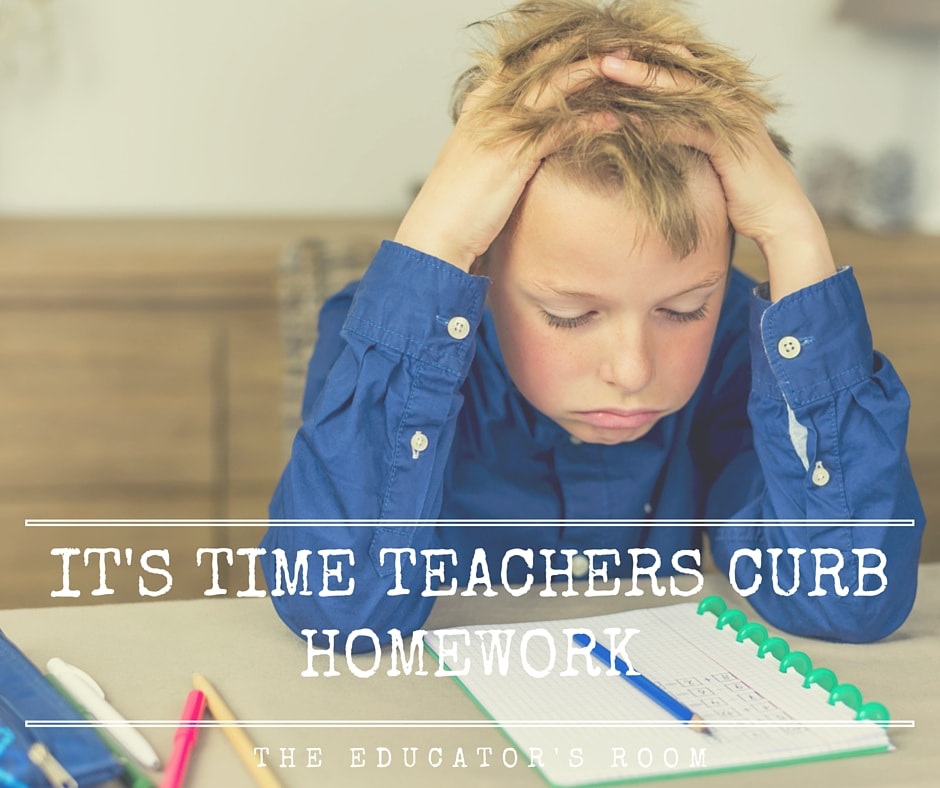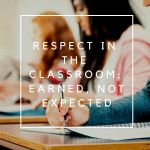Yesterday, my wife came home with her laptop bag. Again. And it’s not her fault.
After working another 9-hour day, that wasn’t enough. She had to put in a bit more time to finish off a few projects so that they were ready for the clients in the morning. My wife doesn’t regularly do this – but when she does, it’s very noticeable to me. It’s also very noticeable to our 4-month old son, who’s usually cradled in her arms and earning every ounce of her attention when she’s home.
In fact, I’m much guiltier of “bringing work home” than my wife. Most of us teachers are. You know there are at least a handful of teachers from you or your child’s school who enter and leave the building with so many bags they put them on wheels. Flight passengers look like they have less luggage.
And that’s when it hit me. We’re all bringing work home with us. The worry. The answering emails. The baggage that is often physical but often something more.
It’s something teachers can stop. We can curb homework – not just for ourselves, or our students, but for something more.
The first step to overcoming any problem is admitting it. This declaration will be as popular as a pension cut, but teachers — we are a huge part of the homework problem. The National Association of School Psychologists recommends that students in primary school should have a maximum of 10 minutes per grade level in elementary school. That means no homework for Kindergarten, 10 minutes for 1st grade, 20 minutes for 2nd, and so on. But those of you with elementary students — either in your classroom or your “smaller classroom” at home — know that this is hardly followed. I mean, what 6-year-old can do 35 minutes of homework?!
The draining effect on homework is now receiving media attention. CNN recently covered a story on how the average high school student has 3.5 hours of homework per night (grossly outpacing the 120-minute maximum by the NASP). The effects on these teens is becoming toxic as well.
While the NEA reports that “homework overload is the exception rather than the norm,” the exceptions are growing in number. Students are suffering from sleep deficiencies (staying up past 11 p.m. for homework is hardly ridiculous anymore, and that’s a problem). Students report increases in both depression and exponentially more anxiety. Students are cutting back on challenging classes and extracurriculars – mostly because they don’t have the time. The clashes with family members have risen.
A large part of that is because of onerous and copious amounts of homework.
The second step is always noting that a power greater than ourselves can restore us to sanity. So I ask our teachers and readers to think about the student that we once were. How much homework did you do after school? Do you remember slaving over the books like your kids did, or do you remember playing with friends? Homework coupled with social media is robbing our children of necessary social time. Channel your inner-13-year-old to help your current one learn how to make a difference.
You also need to stop telling yourself “well, if I don’t do x I’m not going to help them get ready for the next step,” whether it’s the proceeding grade, post-secondary schools, or a profession. Those people already clamor that the students they receive “aren’t ready.”
The third step is always making a decision to cause change. In this case, teachers should ask themselves how they can not only help curb the amount of homework they’re providing, but also what type of homework they’re providing. The Healthy Homework Guidelines from the Race to Nowhere non-profit states that there are 3 principles to consider when it comes to homework. They’re pretty simple:
1.Homework should advance a spirit of learning – Does it promote curiosity, inquiry, and accomplish something that can’t be completed in the student-day or classroom? And is it non-punitive?
2.Homework should be student-directed – Is there student choice in what they want to accomplish? Can they accomplish it without having a parent involved?
3.Homework should promote a balanced schedule – Do students have the appropriate amount of time to complete the assignment without it dominating their lives?
Last year, I started curbing the amount of homework I assign to students. I did this by enacting the following maxims for my own classroom:
1.I’ll assign what I think hard-working students can accomplish in a full class
2.I’ll assign homework that taps their creativity and interests
3.I’ll provide, if possible, 2 nights until homework is due
4.I don’t count homework for as much of a grade (5 points instead of 20) and instead quiz them on the information
5.I’ll assign big projects that allow them to work with peers (or work alone); then I’ll provide them choices on how they want to accomplish the skills, standards, and content at hand.
6.I’ll choose approximately 5-10 students to be my “unofficial feedback committee,” and I’ll ask them questions about class and workload at least biweekly
The results of these changes have been pretty phenomenal. I’ve upped the ante for my students – adding bigger, bolder projects to challenge students at the appropriate levels. They have now started to tell me that “[fusion_builder_container hundred_percent=”yes” overflow=”visible”][fusion_builder_row][fusion_builder_column type=”1_1″ background_position=”left top” background_color=”” border_size=”” border_color=”” border_style=”solid” spacing=”yes” background_image=”” background_repeat=”no-repeat” padding=”” margin_top=”0px” margin_bottom=”0px” class=”” id=”” animation_type=”” animation_speed=”0.3″ animation_direction=”left” hide_on_mobile=”no” center_content=”no” min_height=”none”][insert homework assignment] is fun.” They’re having sleepovers to create games, video recreations, and dig into deep historical research. They’re learning more, enjoying themselves doing it, and not slaving over homework.
Most of all, they have begun to ask me “why don’t I give that much homework?” Usually followed with a “not like we’re complaining or anything.”
That’s where we educators come in. We decry the amount of tests that legislatures hand to students. We are outraged at new, student-phobic policies by national, state, and local governments. We stand opposed to all the bureaucratic red-tape that gives us more to do in our profession and less time with kids.
Yet we completely disregard one thing we have a king’s control over- homework. We inadvertently are giving more for our students to do now than ever. And that’s something that teachers have a sizable – if not the entirety of – control over.
Most of all, these students will eventually become professionals in their own right. If they know nothing but slaving over the books at all hours of the night, is that all they’ll know when they get their own job and start their own family?
This isn’t a dig on entrepreneurs and small business owners who throw themselves entirely into a mission. That would fit the first Homework Health Guideline. This is a dig at the work people take home that turns them into drones instead of family members.
I’d like to see a world where students go home with a backpack that doesn’t look so full. I’d like to see a world where teachers don’t have to put their papers on a cart to take home and grade. I’d like to see a world where my wife feels comfortable leaving her laptop at work. We just need to curb the amount of homework.[/fusion_builder_column][/fusion_builder_row][/fusion_builder_container]






